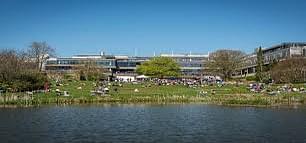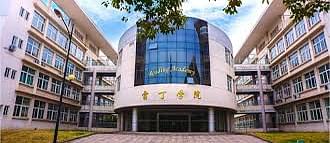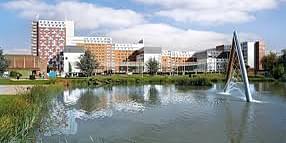Master of Science [M.Sc] (Mechanical Engineering)
Field of Study:
₹30.2 L/Yr
Tuition Fees
| Year | 1st Year Fees |
|---|---|
| Tuition Fees | ₹3023308 (GBP 25750) |
Core modules provide interdisciplinary perspectives drawing from fields including archaeology, classics, history, anthropology, sociology, geography, and political economy. You will survey the historical development of agriculture and food - from the agricultural revolution, to the industrialisation of agriculture and food manufacturing, to the globalisation of food.Ê
At 's programme you will develop an understanding of the place of agriculture and food in the constitution of social identities and institutions - from the family, to social classes and ethnic groups, to the nation. And you will analyse the workings of mainstream and alternative food systems and food chains - from production and processing, to trade and retail, to preparation and service, to consumption and waste.
Optional modules allow you to develop focused expertise in areas such as sustainable food production, health and nutrition, community development, education, or business and social enterprise. You may prepare for further research by taking optional modules in theory and methods in a range of disciplines.Ê
An optional placement or internship will afford you the opportunity to gain valuable professional experience and to develop networks, while the dissertation will provide you with the chance to acquire expertise in a particular area of study and to develop research and writing skills.Ê
Through these varied forms of study, you will actively engage with vibrant food, farming and fishing sectors in Exeter and the Southwest of England.
Careers
With food at the centre of so many pressing global issues today, the field of Food Studies is rapidly developing. The course will equip you to conduct research on foodways and food systems - whether past or present, whether in the UK or elsewhere in the world. It fosters comparative understanding of the economic, political and cultural dynamics of food systems and foodways, as well as critical perspectives that will enable you to identify issues and problems faced by a range of stakeholders and the potential consequences of various forms of intervention and transformation. Upon completion, you will be prepared to articulate these perspectives in various forms - from the writing of reports or scholarly pieces to the production of grant proposals or business plans.
Depending upon your interests and career objectives, you may go on to conduct doctoral research, or you may find employment in: food industry or small and medium-sized food businesses and social enterprises; government departments and agencies engaging with agriculture, fisheries, food manufacture, food safety, public health, or culture and heritage; food-focused print, broadcast and new media; or third sector organizations focused on issues such as environmental sustainability, trade policy, food safety, public health, food poverty, or social isolation.
In addition to the specialist knowledge you will gain during your programme, you will also develop transferrable skills valued by employers such as:
- researching, analysing and assessing sources of information
- written and verbal communication skills
- managing and interpreting information
- developing ideas and arguments
Eligibility & Entry Requirement
Academic Eligibility:
- Students should have Bachelor's degree (4 years) from a recognized university and institution.
- Higher Mathematics and Physics or Engineering Science.
Indian Student Eligibility:
Indian students are eligible to apply if they meet one of the following eligibility criteria:
- The University of Glasgow will consider applications to Master's degrees from graduates of Indian central, state, or leading deemed and private universities.
- Applicants must have achieved a minimum cumulative 1st division or better across all years of their studies.
- Science & Engineering degrees: Theory grades will be accorded greater significance and entry will be entirely at the discretion of the University of Glasgow.
Along with the minimum eligibility requirements, international students hailing from non-English speaking countries need to prove English proficiency through IELTS/TOEFL/any equivalent test.
Scores Required


Do you think the Rankings are wrong ? Report Here
TOP Scholarships
| Scholarship name | Award amount | Eligibility |
|---|---|---|
| - | - | - |
| - | - | - |
| - | - | - |
Key Resources for Your Study Abroad Journey
Course Guides
Masters (MS) in UK: Top Universities, Fees, Requirements & Deadlines
Masters in Mechanical Engineering in UK: Top Universities, Fees, and Placements
Study MA in UK: Top Universities, Admissions, Fees, Scholarships, Jobs
Scholarship Grants & Financial Aids
| Name | Scholarship Per Student | Level of Study | Type | |
|---|---|---|---|---|
| University of Glasgow MBA Scholarships | Scholarship per student₹ 18.9 L/Yr$16,055 | Level Of StudyMaster | TypeCollege-Specific | |
| Glasgow Undergraduate Excellence Scholarships | Scholarship per student₹ 6.4 L/Yr$5,452 | Level Of StudyMaster | TypeCollege-Specific | |
| University of Glasgow International Leadership Scholarship | Scholarship per student₹ 15.9 L/Yr$13,548 | Level Of StudyMaster | TypeCollege-Specific | |
| JN Tata Endowment Scholarship | Scholarship per studentVariable Amount | Level Of StudyDoctorate | TypeMerit-Based | |
| Deutschland Stipendium Program | Scholarship per student₹ 5.1 L/Yr$4,363 | Level Of StudyBachelor | TypeCollege-Specific | |
| Goa Education Trust Scholarships | Scholarship per studentVariable Amount | Level Of StudyMaster | TypeMerit-Based |
Similar Programs
| Program | Important Date | Total Fees | Median Exams Score | Action |
|---|---|---|---|---|
-- | INR 30.2 L/Yr GBP 25,750 /Yr |
| ||
-- | INR 36.9 L/Yr GBP 31,450 /Yr |
| ||
-- | INR 29.1 L/Yr GBP 24,780 /Yr |
| ||
-- | INR 30.8 L/Yr GBP 26,200 /Yr |
| ||
-- | INR 30.2 L/Yr GBP 25,750 /Yr |
|
Do you think the Dates are wrong ? Report Here
Similar Colleges


Robert Gordon University


University of Aberdeen


Aberystwyth University


University of Bath


Cranfield University


Queen's University Belfast


Ulster University


University of Reading

































Comments